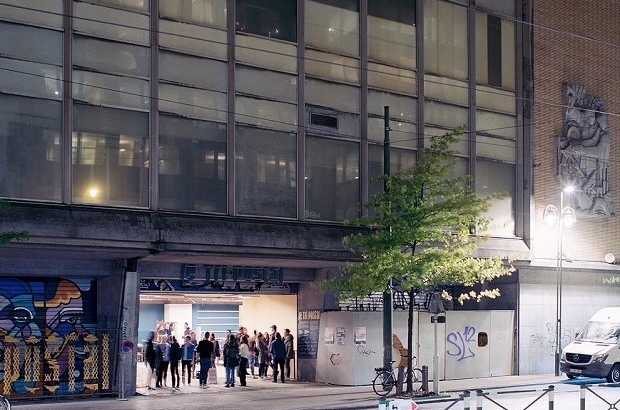- Daily & Weekly newsletters
- Buy & download The Bulletin
- Comment on our articles
Gare du Midi police station 'by end of the summer' to ease problems
Belgian train operator SNCB has announced that a location for the long-promised police station at Brussels-Midi station, which should be ready “by the end of the summer”.
The confirmation comes almost a year since Belgium’s outgoing prime minister Alexander De Croo promised that the troubled transport hub would have its own police station. This goal was part of the action plan established in September 2023 to stop or ease the continuing problems around the station.
"Local and regional authorities and the SNCF asked for this and now it is happening," De Croo said. "The action plan must make a big difference for travellers and local residents."
SNCB spokesperson Dimitri Temmerman has not said where this new police station will be located. The railway operator has always wanted its own police station, with reports of pickpocketing and violence commonplace.
Dealing with security issues is hampered by the fragmentation of powers, a typically Belgian affair. The SNCB is responsible for all buildings, platforms and trains through its Securail security service present 24 hours a day at Brussels-Midi station. It is supported by the railway police, a specialist service of the federal police.
This unit has a greater presence at Midi than at other stations, as it is also responsible for border controls at Eurostar, which recently merged with Thalys.
It is therefore logical that the future police station should be a federal project, financed by the interior ministry.
The SNCB also wants to give local police more powers. “The visible presence of the various police forces is still important, to support our own security officers,” Temmerman said. “In this context, we would like local police to be given more powers in police stations. Not only in Brussels, but also throughout the country.”
Everyone agrees that there is a need for action. More than a year after the major clean-up operation in the capital’s biggest railway station – the first image of Brussels for international travellers – nothing seems to have changed. Theft, violence, drug taking and homelessness are omnipresent.
In a statement, the SNCB points out it has improved lighting in and around the station in several places and since autumn 2023.
“SNCB has also been ensuring that cleaning is carried out more regularly every day in the station," the railway operator said. "In addition, we have decorated a number of entrances and exits to make them more pleasant for passengers and increase the feeling of safety."
However, it is hard not to simply call this window dressing when any passenger going through any entrance of Brussels-Midi station will be hit by the smell of urine and likely accosted by beggars or drunks.
Efforts have been made. Delphine Schelpe, head of the Midi local police zone, told Bruzz that community policing is “a transparent bridge-builder” between a wide range of services, from citizens to government and shopkeepers. “Together we want to optimise the quality of life and safety in our neighbourhoods.”
Since the clean-up, actions have been linked to three areas: prevention and social cohesion, safety and infrastructure. She said that there was now less street crime, violent robberies and break-ins, but added that “not everything has been solved” and that it is difficult to recruit enough staff to ensure safety in the area which is the absolute priority.
Meanwhile artist, homelessness campaigner and local Ecolo candidate Laurent d’Ursel of DoucheFlux, a homeless shelter in Anderlecht, says that the policy in August 2023 of moving all the dealers and drug users “300 metres down the street” has been catastrophic, as it has meant the homeless, people without papers, pickpockets and drug addicts are all in one place.
Yassine Taamallah, owner of the Delhaize supermarket inside Gare du Midi metro station, told Bruzz that in the last six years, “it is always the same thing. Homeless people, people without papers, many come here to steal. When we call, police come quickly, but sometimes you might wait an hour and a half before seeing a general police patrol. And the Stib security officers do not do anything.”
Emiliane Delca, a waiter at Brasserie Europa, opposite the Horta square entrance agrees. “Nothing has improved here. It is their territory,” she said, showing the homeless people on the square. “They do what they want. Every day we are insulted, they come and beg on our terrace and hassle our customers. We never see clients a second time.”
She added that the clean-up operation improved the situation for a while, but this is no longer the case. She has seen no real police patrols since January.
“The Gare du Midi is a big theatre,” one colleague told Bruzz with a smile. “Fights or thefts, there is always something to see.”
Drug use, particularly crack, is omnipresent, with this much cheaper form of cocaine smoked in pipes even outside the station. Crack, on the rise in Brussels, is linked to aggressive behaviour and thefts, and becoming a plague around the station.
"There are many robberies here," said Bouaam El Mostafa, owner of Lunch Factory. "Clients do not return. I have also been attacked. I understand that it is not easy for the police, as those who are arrested are immediately let go, but I see hardly any officers here. I have been in Saint-Gilles for 28 years and have never seen as many aggressions as I am doing now.”
According to some taxi drivers, the area only becomes really dangerous when the station doors shut between 1.45 and 3.30 (or 4.15 at weekends). “People outside with their bags waiting for the station to open are easy prey,” said one taxi driver, who wished to remain anonymous.
“All too often we see them with bloody faces crying or people who have just had ammonia thrown in their face.”


















